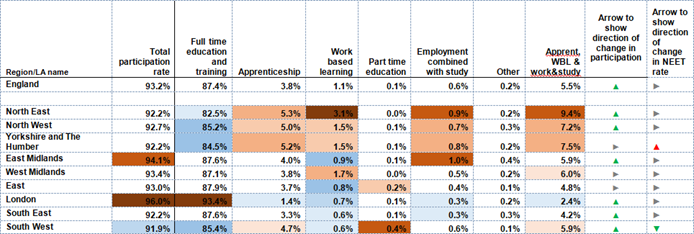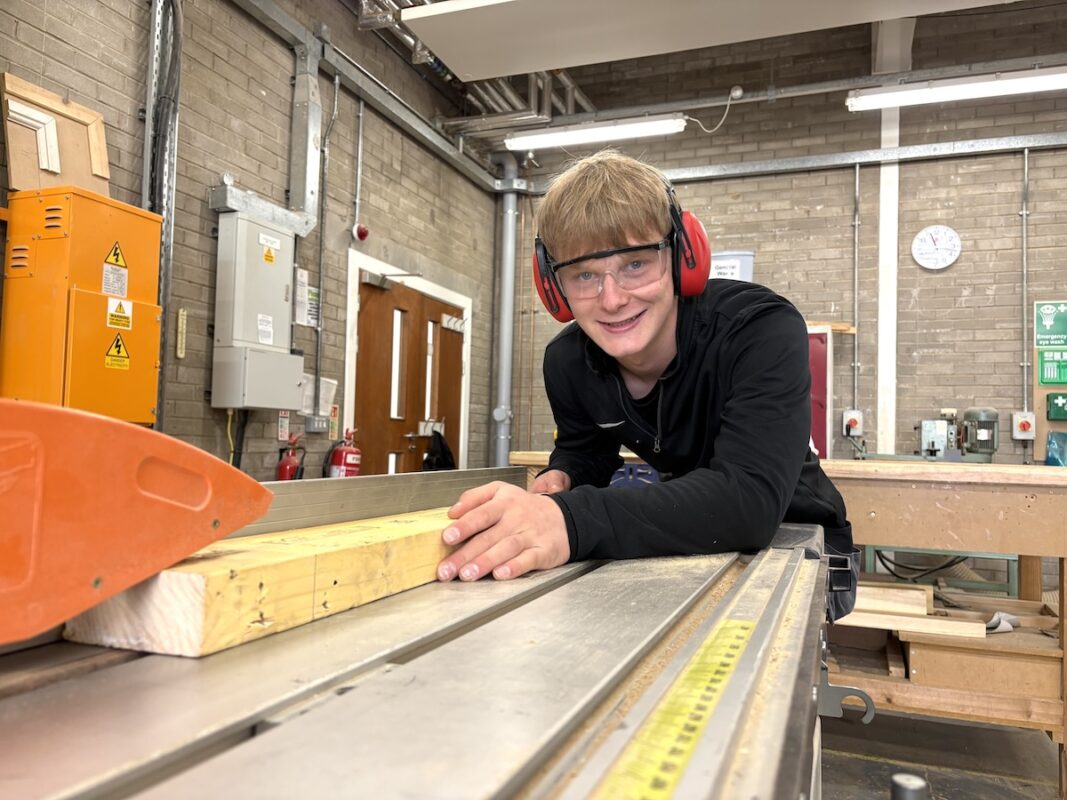Levelling Up Participation by 16-18 Year Olds

The long overdue Levelling Up white paper contains ambitions that are hard to dispute. A policy to transform the UK economy through a place-based approach, to more equally share prosperity across the country and within regions has long been needed.
The white paper envisages a new renaissance – a ‘contemporary Medici model’, boosting productivity, improving public services, restoring a strong community ethos, and empowering local leadership. And it recognises that to catalyse this crucial change addressing the six capitals: physical, human, intangible, financial, social and institutional is central.
Geographical Mobility: Higher Education and Apprenticeships
Digging into the analysis on human capital, however, the vision for the large part is informed by the transformative role of higher education for individuals and society. The benefits of higher education are greater social and geographic mobility, the latter being an important factor in accessing good quality work.
Levelling up, however, should mean geographic mobility is less necessary. Nonetheless the analysis misses a trick. It fails to grasp a key element of how skills were developed in the renaissance.
Apprenticeships get their first mention in a footnote on page 127 of the Levelling Up White Paper. It is not until page 226 (of 305 pages) that we see any substantive content. Here we find a brief commitment to encouraging uptake of apprenticeships by small and medium sized enterprises because they are more likely to take on younger apprentices.
However, there is no clear vision connecting apprenticeships to social and economic outcomes. Coming so soon after the new vision for increasing STEM skills was launched, with its focus on academic qualifications and lack of regard to technical routes, it is hard to see technical and vocational education as other than the poor cousin.
In contrast, apprenticeships played a crucial role in the renaissance. There are strong links to mobility: the model enabled young people to study with a master to acquire skills, to become journeymen who travelled to apply and master those skills before themselves becoming masters and training the new generation. This process helped spread skills beyond the local area and enabled individuals and economies to see returns, sharing prosperity in ways envisaged by levelling up.
Levelling Up and the Apprenticeship Route for 16-18 Year Olds
In better embedding apprenticeship within the Levelling Up vision, we need to throw a spotlight on optimising the route for the young people, especially 16-18 year-olds.
There was a 25% reduction of the 16-18 age group in apprenticeships between 2015/16 and 2019/20. And yet, whilst tentative, analysis suggests that young people taking apprenticeships see better economic returns over attaining the same level of vocational qualification in classroom settings.
Participation in Apprenticeships by 16-18 Year-Olds by Region
The Levelling Up agenda needs a clear vision for furthering apprenticeship in those regions where it remains a strong option of choice and opportunity, while supporting other regions into catch up mode on delivery.
Existing hot spots with high rates of youth participation in apprenticeship are the northern powerhouse regions – the North West and the North East – alongside the South West. Participation in these regions ranges from 5.3% to 4.7% whilst the average in England is 3.8%.
Participation in Jobs without Apprenticeships by 16-18 Year-Olds by Region
Additionally, more young people in the North West, North East and South West enter the labour market at age 16 or 17, through taking up other forms of work-based learning, or a combination of employment and study. This is in contrast to London where the vast majority enter full-time further education (see Figure 1). In the North West, for example, 9.4% of 16-17s participate in some combination of work and study. This compares to an average of 5.5% across England.
Figure 1

Preventing 16-18 Year-Olds becoming NEET Everywhere in England
The data show that rates of NEET (Not in Education, Employment or Training) are now pretty intractable, showing far less positive change than those for overall participation. Should apprenticeship and work-based routes be further undermined, we will see rising rates of NEET in those very areas where we need to increase the share of prosperity. New institutions focused on academic skill sets will not be the solution for these young people.
An Apprenticeship-Led Renaissance
We need to achieve a new apprenticeship-led renaissance. This is vital if we are to level up opportunities for every 16-18 year-old wherever they live in England.
Recommendation 1
We should establish regional and place-based brands, and ‘one-stop shops’ will be key, as SMEs will not engage with a complex system. This one-stop shop can be the go-to resource for schools to overcome the problem of not knowing how to support transitions to apprenticeship, and so defaulting to helping young people to secure post-16 education destinations.
Recommendation 2
We need to develop collaboration between providers and with local economic bodies, Chambers of Commerce and Local Enterprise Partnerships, as well as embedding the apprenticeship vision in policies including Local Skills Improvement Plans alongside Strategic Development Fund plans.
Recommendation 3
For the youngest age groups to succeed, we need to ensure Level 2 is embedded in the apprenticeship standard and that the standard then allows the progression to Level 3, where occupations require this. Functional maths and English skills are what employers want.
Becci Newton, Director of Public Policy and Research, Institute for Employment Studies
Post-16 Education and Skills: Levelling Up Everyone, Everywhere
Campaign for Learning’s paper Post-16 Education and Skills: Levelling Up Everyone, Everywhere, is a collection of 18 articles and recommendations by leading stakeholders and thinkers across the post-16 education and skills sector.
The paper covers six key considerations for the Levelling Up agenda – national and place based strategies, young people, lifelong training, lifelong learning and post-16 providers.
As the articles show, from the perspective of post-16 education and skills policy, levelling up is about people as well as places – the policy canvas is vast, the perspectives diverse and the insights important.
Together, our authors demonstrate the need for strong, nationally based as well as place based strategies if everyone, everywhere aged 16 and over are to level up through education and skills’
Part 1: Levelling Up and National and Place
- Andy Westwood, Professor of Government Practice, University of Manchester - Levelling Up and the Department for Education
- Sam Freedman, Research Fellow, Institute for Government – Levelling Up and Post-16 Education and Skills
- Fiona Aldridge, Head of Skills Insight, West Midlands Combined Authority – Levelling Up the West Midlands by 2030
- Mark Hilton, Policy Director, London First – Levelling Up London by 2030
Part 2: Levelling Up and Young People
- Geoff Barton, General Secretary, ASCL - Levelling Up and Education: Lots of Stuff but Little Substance
- Sam Tuckett, Senior Researcher, Education Policy Institute – Levelling Up 16-19 Education
- Becci Newton, Director of Public Policy and Research, IES – Levelling Up Participation by 16-18 Year Olds
- Kathleen Henehan, Senior Policy and Research Analyst, Resolution Foundation – Levelling Up 18-24 Year Olds in England
Part 3: Levelling Up and Lifelong Training
- Olly Newton, Executive Director, The Edge Foundation - Placing Vocational Education at the Heart of Levelling Up
- Mandy Crawford-Lee, Chief Executive, UVAC – Higher Technical Education, Higher & Degree Apprenticeships and Levelling Up
- Ewart Keep, Emeritus Professor, University of Oxford – The Role of Employer Training in Levelling Up
Part 4: Levelling Up and Lifelong Learning
- Stephen Evans, Chief Executive, L&W – Levelling Up in England through Lifelong Learning
- Susan Pember, Policy Director, HOLEX – Levelling Up as a Nation of Lifelong Learning
- Simon Parkinson, Chief Executive, WEA – The Future of Adult Learning is in the Hands of Local Leaders
Part 5: Levelling Up and Post-16 Providers
- David Hughes, Chief Executive, Association of Colleges – Well-Funded Colleges to Serve Every Community
- Nick Hillman, Director, HEPI – A ‘Higher Education Institute’ in Every Community
- Chris Hale, Director of Policy, Universities UK – Levelling Up and Widening Participation into Higher Education
- Jane Hickie, Chief Executive, AELP – Levelling Up is as much about People as Places











Responses